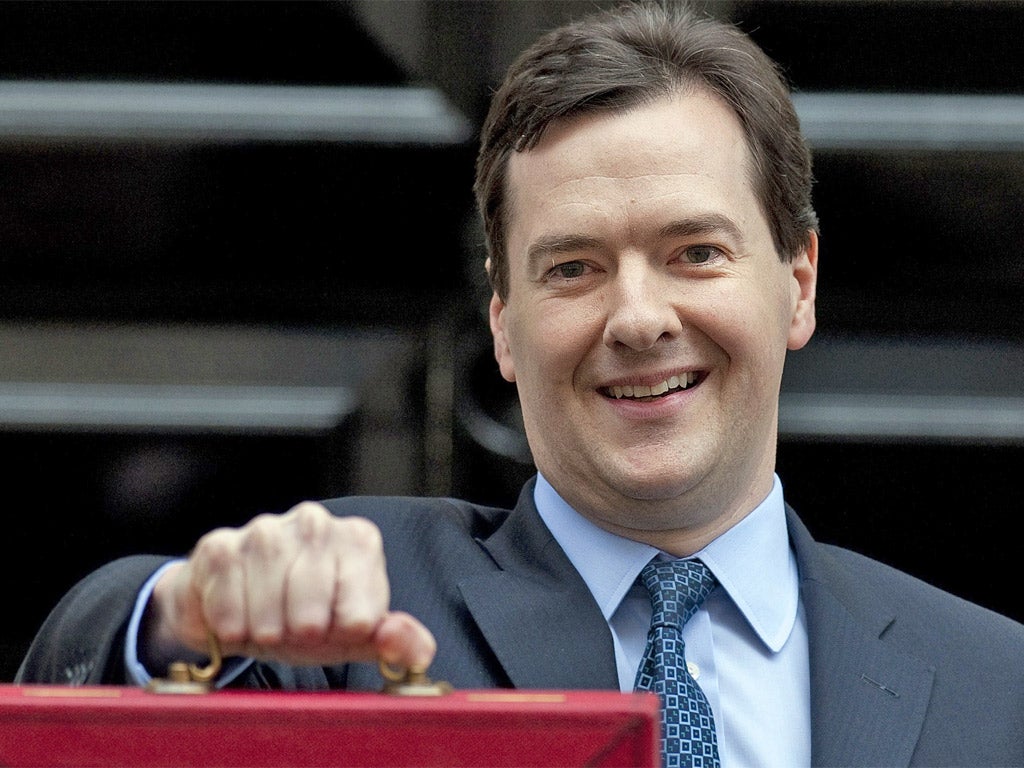Budget 2013: Missed targets and more gloom
Editorial: A couple of eye-catching initiatives from George Osborne are not enough to give Britain the lift that it needs. The light at the end of the tunnel is receding

Your support helps us to tell the story
From reproductive rights to climate change to Big Tech, The Independent is on the ground when the story is developing. Whether it's investigating the financials of Elon Musk's pro-Trump PAC or producing our latest documentary, 'The A Word', which shines a light on the American women fighting for reproductive rights, we know how important it is to parse out the facts from the messaging.
At such a critical moment in US history, we need reporters on the ground. Your donation allows us to keep sending journalists to speak to both sides of the story.
The Independent is trusted by Americans across the entire political spectrum. And unlike many other quality news outlets, we choose not to lock Americans out of our reporting and analysis with paywalls. We believe quality journalism should be available to everyone, paid for by those who can afford it.
Your support makes all the difference.Try as he might, the Chancellor could not conjure up economic cheer where there was none. Indeed, yesterday’s Budget was his gloomiest yet.
Even the supposedly rousing rhetoric – the repeated references to an “aspiration nation”, the invocation of those who want to “work hard and get on”, the thunderous finale about a Britain “prosperous, solvent and free” – had the wearying ring of a plea to stand strong in the face of bad news.
Sure enough, plenty came. George Osborne was no doubt relieved to cite the Office for Budget Responsibility assessment that Britain will avoid a politically disastrous third dip into recession. But he was still forced to concede that the economy is now expected to grow by an anaemic 0.6 per cent this year – a woeful half of the rate forecast as recently as December.
Equally, although the state’s annual overspend has been slashed by a third, growth is so feeble, and tax revenues are so depressed, that borrowing remains stubbornly high. The result? Britain’s debts will take longer than ever to restrain. For all the Chancellor’s “difficult decisions”, then, efforts to bring the public finances under control have, at best, stalled.
Sad to say, there is no easy solution. Britain’s borrowing levels are still colossally high compared with Germany’s, say, or France’s. Were Mr Osborne to splash out on debt-funded Keynesian spending, as his critics recommend, the black hole would grow bigger still. Meanwhile, so spectacular a U-turn – on the central principle of the Government’s economic policy, no less – risks spooking the ever-twitchy bond markets, with disastrous results for the interest rates paid by all of us. A fiscally neutral Budget was, therefore, the only option.
The difficulty for the Chancellor is that he is left with next to no room for manoeuvre. The best that can be said is that, in the face of such constraints, he is – finally – trying to shift spending into the most economically productive areas. Whitehall departments (and public sector pay more generally) are to be squeezed harder than ever. And the proceeds are to be channelled into infrastructure investment, tax cuts – most notably a subsidy for employers’ national insurance contributions – and an eye-catching attempt to galvanise the moribund house-building sector by offering buyers of newly built homes help with their deposits.
Eye-catching, perhaps. But not enough to give the instant lift that both the economy and the Chancellor himself so desperately need. The combined effect of Mr Osborne’s long list of tweaks and twitches – from the promise of another percentage point off corporation tax, to the hike in research and development incentives, to the abolition of stamp duty on trade in growth stocks – may give a tilt to Britain’s economic balance over the medium term. They may even, ultimately, help us compete in the global race. They will do little to shake off the torpor of the here and now, though.
In an attempt to distract attention from the fact that the light at the end of the tunnel is only ever receding, the Chancellor did scratch together a smattering of crowd-pleasers. The looming rise in petrol duty was cancelled, and a penny will come off the price of beer. Childcare costs will be defrayed (albeit marginally, and only for some) and the income tax threshold will rise to £10,000 in 2014 (something of a coup for his Liberal Democrat coalition partners). And he did, at least, manage expectations more effectively than last year.
But Mr Osborne’s rabbits are scrawny and his hat threadbare. And for all that the Treasury is attempting to be creative at last – not least in formally recruiting the Bank of England to help boost growth – the Chancellor’s new-found urgency is 18 months overdue. The immediate economic outlook is bleak. Yesterday’s Budget did little to improve it.
Join our commenting forum
Join thought-provoking conversations, follow other Independent readers and see their replies
Comments